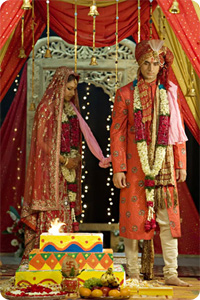Weddings in India
Notice: Function wpdb::prepare was called incorrectly. The query argument of wpdb::prepare() must have a placeholder. Please see Debugging in WordPress for more information. (This message was added in version 3.9.0.) in /var/www/vhosts/indiavision.com/httpdocs/wp-includes/functions.php on line 6085
Notice: Function wpdb::prepare was called incorrectly. The query does not contain the correct number of placeholders (0) for the number of arguments passed (1). Please see Debugging in WordPress for more information. (This message was added in version 4.8.3.) in /var/www/vhosts/indiavision.com/httpdocs/wp-includes/functions.php on line 6085
Seven Vows Of Marriage
Hindu wedding is all about rituals and customs, which teach us the actual essence of a blissful married life. The seven vows of marriage symbolize seven promises, which are sworn by the bride and the groom during the auspicious ceremony of wedding. During the marriage, a sacred fire is created with ghee and wooden sticks, in order to evoke Agni (fire god), which serves as the witness to the ritual of seven vows. The priest, who conducts the wedding, chants Vedic mantras. Amidst the blazing fire of the havankund and the chanting of mantras, the bride and the groom pledge their commitment to each other, for the lifetime. Known as Saptapadi/pheras, seven vows is a beautiful ritual observed in Hindu marriages, although the act of taking the seven vows varies from region to region, in India.
| Other CategoriesNotice: Function wpdb::prepare was called incorrectly. The query argument of wpdb::prepare() must have a placeholder. Please see Debugging in WordPress for more information. (This message was added in version 3.9.0.) in /var/www/vhosts/indiavision.com/httpdocs/wp-includes/functions.php on line 6085 Notice: Function wpdb::prepare was called incorrectly. The query does not contain the correct number of placeholders (0) for the number of arguments passed (1). Please see Debugging in WordPress for more information. (This message was added in version 4.8.3.) in /var/www/vhosts/indiavision.com/httpdocs/wp-includes/functions.php on line 6085 Arya Samaj Wedding Christian Wedding Ceremony Hindu Marriage Act Muslim Wedding Ceremony Indian Wedding Facts Kanyadaan Marriage Legalities in India Sikh Wedding Rituals Parsi Wedding Ceremony Special Marriage Act Muslim Marriage Act Marriages in Different Religions Famous Indian Weddings Seven Vows Of Marriage Indian Baraat Wedding Photography Main CategoriesNotice: Function wpdb::prepare was called incorrectly. The query argument of wpdb::prepare() must have a placeholder. Please see Debugging in WordPress for more information. (This message was added in version 3.9.0.) in /var/www/vhosts/indiavision.com/httpdocs/wp-includes/functions.php on line 6085 Notice: Function wpdb::prepare was called incorrectly. The query does not contain the correct number of placeholders (0) for the number of arguments passed (1). Please see Debugging in WordPress for more information. (This message was added in version 4.8.3.) in /var/www/vhosts/indiavision.com/httpdocs/wp-includes/functions.php on line 6085 Indian Weddings Wedding Decoration Tips Pre Wedding Functions Post Wedding Functions Hindu Marriages Indian Wedding Day Functions Muslim Wedding Ceremony Malayalee Wedding Ceremony Kannada Wedding Ceremony Kashmiri Wedding Ceremony Oriya Wedding Ceremony Tamil Wedding Ceremony Bengali Wedding Ceremony Punjabi Wedding Ceremony Jain Wedding Ceremony Maithil Brahmin Wedding Ceremony Sindhi Wedding Ceremony Telugu Wedding Ceremony Maharashtrian Wedding Ceremony Assamese Wedding Ceremony Jewish Wedding Ceremony Marwari Wedding Ceremony Buddhist Wedding Ceremony Gujarati Wedding Ceremony Planning Your Honeymoon Indian Bride Indian Groom Indian Wedding Features Marriage Problems Indian Wedding Preparation Indian Wedding Planners Post Wedding Preparation Main Day Function |
